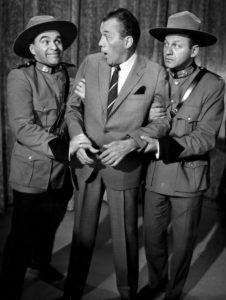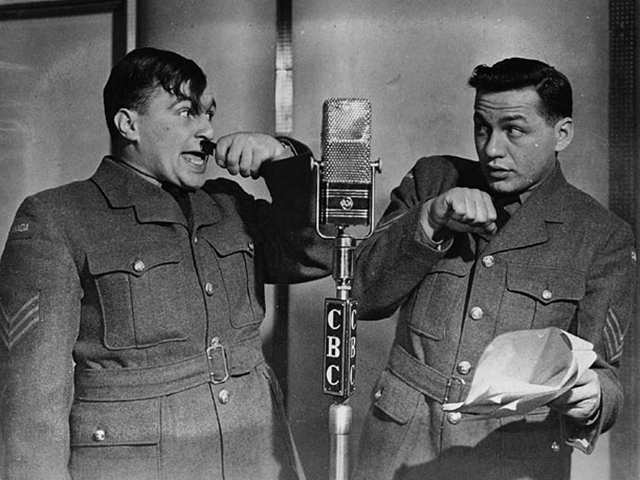In honour of Canada’s 150th birthday, The CJN presents 40 profiles of some of the most prominent Jewish Canadians throughout our history.
For decades, Wayne and Shuster were one of the most popular comedy teams north – and south – of the border.
With their unique brand of wholesome, literate humour, Johnny Wayne and Frank Shuster were a fixture on Canadian television. They also appeared a record 67 times on The Ed Sullivan Show, which was, at the time, the premier variety show in the United States.
They made their debut on Sullivan’s show in May 1958, with their performance of Wipe the Blood Off My Toga, a sketch that turned the assassination of Julius Caesar into a detective story. The skit was famous for its signature line, in which Caesar’s wife, in a heavy New York accent, tells Wayne, who was playing a Roman detective, that she warned her husband not to go to the Senate: “I told him, ‘Julie don’t go. Julie don’t go.’ But he wouldn’t listen.… I said, it’s the Ides of March. Beware already. I told him don’t go. But he wouldn’t listen. I told him don’t go.”
Over the years, the most popular TV shows underwent the Wayne and Shuster treatment, from their version of Star Schtick, to The Six Hundred Dollar Man, in which the organization SHLEP rebuilds a Canadian astronaut for the bargain-basement price of $600.
At their peak, they were hugely popular – not bad for a couple of high school buddies who got together at Harbord Collegiate and went on to develop their craft at the University of Toronto, where they were English majors.
Wayne, who was born John Louis Weingarten (a surname he would use in various skits throughout the years), and Shuster, came into the world a few months apart in 1918.
READ: THE CJN’S SPECIAL COVERAGE OF CANADA’S SESQUICENTENNIAL
They met at Harbord Collegiate, then in the heart of Toronto’s Jewish community, and began writing and performing comedy skits together. In 1941, they appeared on a radio show in Toronto, dispensing advice to householders.
After enlisting in the Canadian Armed Forces in the Second World War, they were put to work writing and performing in The Army Show.
After returning to Canada, they worked together at CBC Radio. Later, they performed on television, developing sketches that were described as “an amiable mixture of slapstick, pantomime, visual tricks, sheer corn and sometimes ingenious twists on classic situations.”
Shuster generally played the straight man, while Wayne played his mischievous buddy with a twinkle in his eye. Shuster was the cousin of Joe Shuster, the creator of Superman. His daughter, Rosie, was a writer on Saturday Night Live and his son-in-law, Lorne Michaels, was the creator of the show.
Their comedy skits were numerous, and while they weren’t always the critics’ cup of tea, they remained enormously popular around the world. In 1980, 80 half-hour specials were syndicated worldwide, including in the United States and South Africa.
Of all their skits, their favourite was one that combined their love of literature with baseball and comedy.

The Shakespearean Baseball Game: A Comedy of Errors, Hits and Runs was first performed in 1958 and featured memorable pseudo-Shakespearean dialogue, such as: “Lay on Macduff! And watch out for that breaking stuff!”
When Macduff hits a ball down the line that the umpire calls foul, the catcher says: “You, sirrah, that ball was fair!”
The umpire replies: “That ball was foul!”
“So fair a foul I have not seen!” the catcher responds.
Ed Sullivan hand picked Wayne and Shuster to perform on his show, which was a fixture on American television for years. Sullivan described them to the CBC as “literate, they are truly amusing and gay,” the latter descriptor a reference not to their sexual orientation, but to a feeling of lightheartedness.
He also told them to “please stay in Canada and don’t be contaminated by any of our gag writers down here.”
It’s advice they took, remaining in Canada and performing until Wayne’s death in 1990. Shuster passed away in 2012.
On a personal note, this reporter interviewed them early in my career at The CJN. In my household, they were major television stars, so I was somewhat nervous before the interview. The two turned out to be the friendliest, warmest, most considerate stars one could ever hope to meet. They were unpretentious and full of fun, apparently doing their best to give me material for a story. When I told my mother I had interviewed the pair, she was awe struck. It wouldn’t have impressed her more if I’d interviewed John Wayne or Kirk Douglas.
For their fans, Wayne and Shuster were always fresh, funny and even gay.
